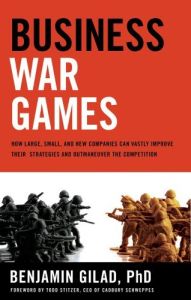Join getAbstract to access the summary!

Join getAbstract to access the summary!
Benjamin Gilad
Business War Games
How Large, Small, and New Companies Can Vastly Improve Their Strategies and Outmaneuver the Competition
Career Press, 2008
What's inside?
How to make war work for you: An introduction to war gaming from one of its leading practitioners.
Recommendation
This short manual provides an action-oriented introduction to the art of the war game. Benjamin Gilad presents interesting anecdotes and examples from ancient and contemporary military and economic history. He offers a general description of the war-game process, the circumstances under which this role-playing exercise is appropriate, and tips on what to do and not do. He also supplies a detailed by-the-clock description of an exemplary war game. getAbstract finds that his book will help any manager who is considering using war gaming and is wondering how to start.
Summary
About the Author
Benjamin Gilad, Ph.D., ran war games for 25 years on behalf of Fortune 500 clients in various industries. He is a former associate professor of strategy at Rutgers University’s School of Management, and the founder and president of The Academy of Competitive Intelligence.
















Comment on this summary